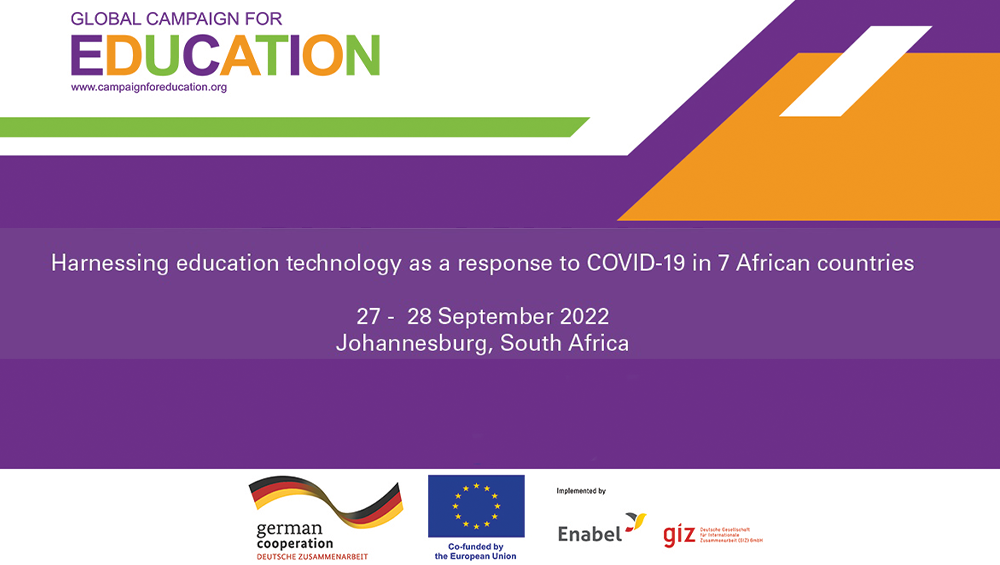#GCEEduTechSeminar Harnessing Education Technology Research Seminar Lessons and best practices from Rwanda

GCE has convened members from Burundi, Democratic Republic of Congo, Madagascar, Malawi, Namibia, Rwanda, and Zambia) for a two-day seminar on Harnessing Education Technology as a Response to COVID-19 in Johannesburg, South Africa (27- 28 September 2022).
GCE is happy to share with you the following reflective lessons from Rwanda:
1. Harnessing Education Technology Research Seminar Lessons and best practices from Rwanda
Presented by Benson Rukabi, Rwanda Education for All Coalition (REFAC)
Rwanda has official frameworks for integrating technology in education and smart learning in schools. These include the Smart Rwanda Master Plan, ICT Strategic Plan 2018/24, ICT Hub Strategy 2019/24 and ESSP 2018/24. These frameworks have been the critical success factor in the promotion of EduTech in Rwanda as they govern and coordinate the implementation of eLearning n the public education system in Rwanda. Implementing the SMART Classroom Pilot intervention (One Digital Identity per Child) rolled out by the Ministry of Education provided a critical mechanism to fast-track education technology adoption in the country, resulting in each school having a smart classroom. From this initiative, schools were equipped with computers and internet access to realise the belief that ICT infrastructure and digitalisation of material are critical for transforming and increasing the country’s accessibility to education. Notwithstanding the successes realised in harnessing education technology in Rwanda, the following limitations were the key factors that affected the success of the adopted e-learning methodologies:
- Lack or limited knowledge of eLearning policy and regulatory frameworks.
- Lack of technological infrastructure to translate policy into practice
- Lack of or limited internet connectivity in basic education facilities (rural vs urban).
- Lack of or little knowledge and skills to use ICT in teaching and limited availability of digital content.
2. REFAC’s intervention and results
Through the GCE’s Harnessing EduTech Project funded by GIZ, REFAC undertook a study entitled, “current ICT in education policy guideline and effects of covid-19 on the education sector in Rwanda”. The study aimed to document the current gaps in the eLearning policy frameworks and their implementation during the COVID-19 period. The study also identified Rwanda’s current ICT opportunities in education policy guidelines and drew recommendations to improve eLearning quality.
The study revealed various findings and placed forward a number of recommendations which were used to engage with the Ministry of Education and other education stakeholders in the country to influence better e-learning methodologies. These included;
- The need to ensure extensive consultation in developing policies and guidelines on the use of ICT in education and the wide dissemination of adopted policies.
- The need to put in place the relevant teaching and assessment guidelines to ensure quality delivery of courses.
- Develop guidelines on the use of e-learning platforms.
- Follow up and monitor the use of ICT and ensure this is institutionalised.
- Support schools, teachers and learners to access digital equipment.
- Ensure inclusive use of ICT in basic education for learners with disabilities.
As a result of REFAC’s intervention, the Ministry of Education and other education stakeholders became more cognizant of the effects of COVID-19 on education. They committed to strengthening existing e-learning strategies accordingly. The Ministry also committed to adopting better e-learning-friendly methods during and after the pandemic and pledged to harness the capacity of teachers in ICT as a solution in the education sector. The Government, schools, parents, and partners agreed to work together to effectively respond to the shocks and effects of the COVID-19 pandemic on the education sector by particularly ensuring that no one is left behind because of COVID-19 broad effects (especially children from vulnerable and low-income families). However, this commitment requires further investments, engagements, and changes in attitudes and capacities strengthening, among others. Success stories include a reduction of the workload on teachers, low repetition rates, more reach, continuous learning, the ability for learners to replay lessons, etc.


